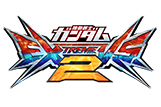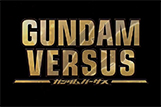 One of the PlayStation 3’s launch games, that of Gundam: Target in Sight, has drawn a fair amount of flak for being, well, rubbish. This criticism is wholly justified however but the consequent reasoning that all Gundam action games are rubbish is fallacious at best.
One of the PlayStation 3’s launch games, that of Gundam: Target in Sight, has drawn a fair amount of flak for being, well, rubbish. This criticism is wholly justified however but the consequent reasoning that all Gundam action games are rubbish is fallacious at best.
Like all licensed games, Gundam has had a chequered history in regards to gaming quality. There are some truly appalling entries into the gaming canon but there are also some equally fantastic entries too, it’s just unfortunate that the former receive more attention than the latter. As such, I think it’s only fair that the good Gundam games get their chance in the sun.
Gundam: The Blue Destiny Trilogy (Saturn)
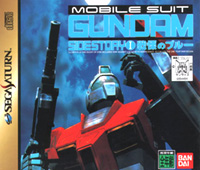 This was a game actually released in three separate chapters and it covered the story of one frontline GM mobile suit pilot by the name of Yu Kajima. Unlike the Gundam games before it, the Blue Destiny games had the player start out with a underpowered mobile suit, rather than an eponymous Gundam. Taking down a Zeonic mobile suit was a tricky task and got progressively harder with each chapter of the game (even though the player got access to increasingly more powerful mobile suits, finally including a Gundam). In having the player partake in a more personal take on the horrific One Year War, it grounded the whole game. Not to mention having it play purely in the first person through a claustrophobic cockpit view, added a palpable tension to the proceedings (something that playing as the almost invincible Amuro Ray previously failed to accomplish).
This was a game actually released in three separate chapters and it covered the story of one frontline GM mobile suit pilot by the name of Yu Kajima. Unlike the Gundam games before it, the Blue Destiny games had the player start out with a underpowered mobile suit, rather than an eponymous Gundam. Taking down a Zeonic mobile suit was a tricky task and got progressively harder with each chapter of the game (even though the player got access to increasingly more powerful mobile suits, finally including a Gundam). In having the player partake in a more personal take on the horrific One Year War, it grounded the whole game. Not to mention having it play purely in the first person through a claustrophobic cockpit view, added a palpable tension to the proceedings (something that playing as the almost invincible Amuro Ray previously failed to accomplish).
In terms of gameplay, the game functioned around fixed lock-ons that allowed the player to orbit a target. Combat was also split into distanced and melee accordingly. Despite being in an underpowered unit initially, the game moved at a fast pace and required the player to be pretty nimble on their mechanical feet. In edition to the fast paced combat the player also had two wingmen that aided them throughout each mission, though the game lacked the means to give them orders. Unfortunately, this never got a Western release (though bizarrely the manga did) but the Blue Destiny games and especially the iconically azure mecha have received a fair amount of usage elsewhere (both in game and toy form).
Gundam: Rise from the Ashes (Dreamcast)
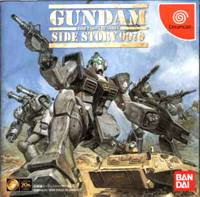 To all intents and purposes this was a gaming sequel to the Blue Destiny games. The player headed the White Dingo mobile suit platoon and had the difficult task in participating in the liberation of Australia from Zeonic occupying forces.
To all intents and purposes this was a gaming sequel to the Blue Destiny games. The player headed the White Dingo mobile suit platoon and had the difficult task in participating in the liberation of Australia from Zeonic occupying forces.
Much like in Blue Destiny, the player controlled an underpowered frontline mobile suit from a gritty first person cockpit view. The big addition to Rise from the Ashes though was the ability to directly control your two wingmen and give them very specific orders.
The tactical platter available was immense and added a whole new dimension to the game. Using your wingmen to flush out a mobile suit and leaving it open for you to snipe it at a comfortable range made the game more engaging and cerebral. This is not to say that the combat wasn’t as fast and responsive as the Blue Destiny iterations before it but the additional strategic focus rounded the game off beautifully.
This actually got an American release but with it only being one chapter, rather than three, made the game a bit shortlived in terms of content (it also criminally lacked any kind of multiplayer, a sin indeed for an online console). There was a Japanese only Premium Disc released, where you squared off against the White Base mobile suit team, but it was a token reprieve than anything truly substantial.
Gundam: Lost War Chronicles (PlayStation 2)
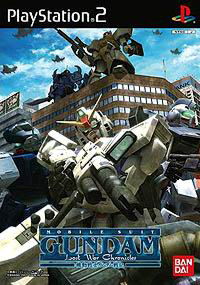 On the PlayStation 2’s release, Bandai released a Gundam game that tediously had you play as Amuro Ray and re-enact the narrative from the original TV series and movies. It was slow, clumsy to control and really rather dull. However, upon completing the game extra levels were unlocked that had the player traverse a much larger and more complex environment. Entitled Tactics Battle it was clear that this was the game that the team originally wanted to make.
On the PlayStation 2’s release, Bandai released a Gundam game that tediously had you play as Amuro Ray and re-enact the narrative from the original TV series and movies. It was slow, clumsy to control and really rather dull. However, upon completing the game extra levels were unlocked that had the player traverse a much larger and more complex environment. Entitled Tactics Battle it was clear that this was the game that the team originally wanted to make.
A few years later Lost War Chronicles was released, lo and behold it was very much a faster and more responsive version of the previous game but was entirely based around that extra Tactics Battle mode. In addition, the player also now had two wingmen which, you guessed it, could be tactically deployed for that strategic ass kicking touch.
This also came packaged with an optional cockpit view as well as a massive roster of playable mobile suits, including those from the Blue Destiny trilogy and Rise from the Ashes. The increased game speed also massively helped the game however and made the combat consequently more visceral. Unfortunately, certain elements were simplified in regards to the controlling of the wingmen (they only had three preset commands).
Again, Lost War Chronicles only received a Japanese release (yet the manga got published abroad). The big bonus over the previous two games though was that it featured an expansive multiplayer mode, including co-operative missions. There’s quite a nice boxset of this game for those that have the perseverance to track it down.
Gundam: Zeonic Front (PlayStation 2)
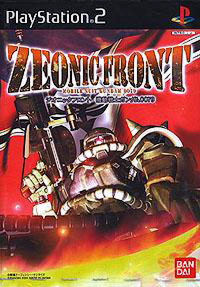 Unlike the previous games before it, Zeonic Front approached the One Year War conflict from the opposite side; that of the Principality of Zeon and their brutal attempt for independence.
Unlike the previous games before it, Zeonic Front approached the One Year War conflict from the opposite side; that of the Principality of Zeon and their brutal attempt for independence.
Despite the shift in perspective the other major change was that both you and your enemies could be despatched with great ease. Meaning the tactical control had to be expanded quite a bit.
The game solved this by having three teams of three mobile suits each that could be programmed to undertake a mission with military precision. The tactical control of Zeonic Front surpasses the previous games quite substantially. Prior to each mission you have to set up routes for subordinates to follow whilst completing their objectives unscathed.
It’s a unique experience to face Amuro Ray in his RX-78-2 Gundam and have him obliterate your team mates whilst coldly counting his kills, leaving you standing there to be eventually capped in the back of the head with a lone beam rifle shot. Naturally, when I finally managed to take him out with all my subordinates alive, I pretty much punched the air with joy.
Zeonic Front was a harder game than those that went before it but richer for the refined strategy demanded on the part of the player. Thankfully, this received an American release and can be acquired with relative ease.
Gundam: One Year War (PlayStation 2)
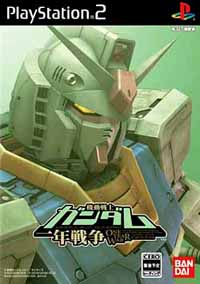 One of the final Gundam games released on the PlayStation 2 and undertaken by Namco before the Bandai merger, One Year War was a game that ran counter to the belief that taking on the mantle of Amuro Ray was bad for gameplay. Initially given the moniker of Project Pegasus, it was meant to conglomerate the entirety of the original Gundam TV series and movies into one game. Bear in mind that Bandai had to release two separate games to cover the story properly, namely separating land and space combat. One Year War used a beautifully fluid and simple control setup to combine them both effortlessly. It was also one of the most visually impressive Gundam games with some wonderful effects to display the whole enigmatic Newtype state of mind.
One of the final Gundam games released on the PlayStation 2 and undertaken by Namco before the Bandai merger, One Year War was a game that ran counter to the belief that taking on the mantle of Amuro Ray was bad for gameplay. Initially given the moniker of Project Pegasus, it was meant to conglomerate the entirety of the original Gundam TV series and movies into one game. Bear in mind that Bandai had to release two separate games to cover the story properly, namely separating land and space combat. One Year War used a beautifully fluid and simple control setup to combine them both effortlessly. It was also one of the most visually impressive Gundam games with some wonderful effects to display the whole enigmatic Newtype state of mind.
This is one of the few, probably only, Gundam games that work in terms of re-creating the original Gundam narrative without being clumsy and slow. The controls massively help this by emulating an FPS for the dual analogue usage. There’s also a subtle lock-on implemented as well, which gently snaps to a target once the cursor is passed over it.
It’s a strange feeling to try and explain but coupled with the animation, the controls really feel like how a mobile suit should move. As such, One Year War is a joy to play and feels very natural. There are a few bizarre on-rails first person sequences admittedly but the mobile suit combat more than makes up for this.
Typically, One Year War only received a Japanese release and there’s no word on whether the Project Pegasus team will do any more Gundam games (despite the game receiving multiple awards and selling well).
…and the list goes on
Whilst I’ve only mentioned five games here, there are many others that are as good. The recent Gundam SEED arcade games (and their subsequent ports), courtesy of Capcom, are particularly accomplished (though their earlier Gundam games haven’t been great). Not to mention the amazing Senjou no Kizuna arcade game that actually has you sit in a panoramic cockpit is rather impressive.
The point to understand about Gundam games on the whole is that they are wish fulfillment for those who want to immerse themselves in that setting. If you hate the anime the games are spawned from, then you will miss out on a lot of what they have to offer. Though, this can be equally said for any license based game.
There are real Gundam gaming clunkers around however, with Target in Sight being one of them. That being said all is not lost for the next generation of Gundam gaming; the recent Gundam Senki, a spiritual successor of sorts to Lost War Chronicles, on the PS3 is utterly fantastic.

